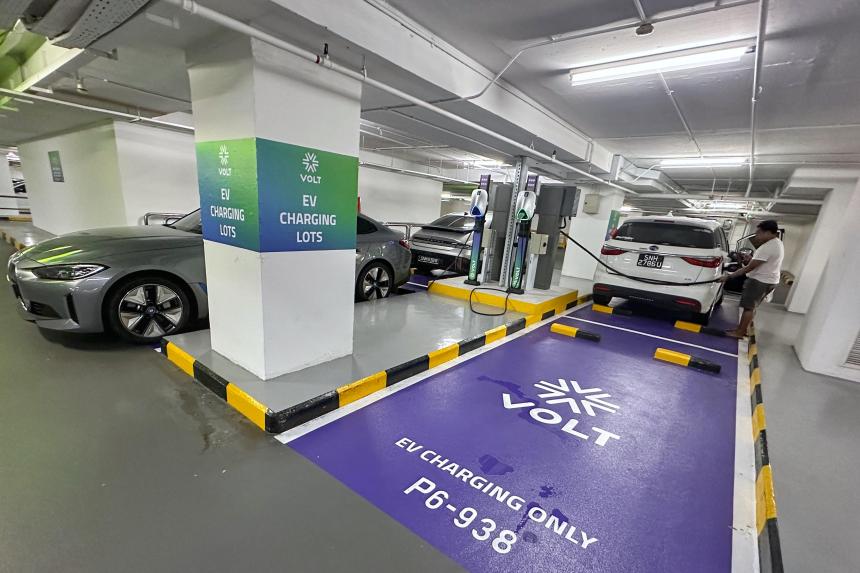SINGAPORE - The number of electric vehicle (EV) chargers installed in condominiums with the support of a government grant has more than doubled in the space of five months.
As at August, 578 EV chargers have been installed at 212 non-landed private residences with the support of the EV Common Charger Grant, the Land Transport Authority told The Straits Times.
By comparison, there were 267 chargers installed at 107 condos with the grant’s support as at March. As at July 2022, there were 66 such chargers at 27 condos.
The figure in August is 28.9 per cent of the grant’s cap to co-fund the installation of 2,000 chargers. Applications opened in July 2021 and the grant is available till Dec 31, 2025.
Companies behind the installation of chargers at condos expect more to come on stream when new laws that lower the threshold needed to pass resolutions to install EV chargers at strata-titled developments come into effect.
Expected to kick in by the end of 2023, the changes include lowering the voting threshold for the installation of EV chargers in condos to 50 per cent of residents, down from 90 per cent. The changes are part of the Electric Vehicles Charging Act, which was passed in 2022.
Kigo, one of the operators of condo EV chargers, said that compared with a year ago, there has been a 60 per cent to 80 per cent increase in inquiries and requests for proposals from condos.
But when the proposals are put up for voting, there have been situations where the motions failed to reach the required 90 per cent threshold, at times by a single vote, said Kigo.
Mr Dean Cher, head of mobility at SP Group, another EV charging provider, said: “Post-amendment, when the implementation hurdle is lower, we are hopeful of more resolutions passing through.”
A definitive number of condos equipped with EV charging points is unavailable because there is no central database tracking chargers that are not accessible by the wider public.
Capped at $4,000 for each charger, the EV Common Charger Grant foots up to half the bill for three components: the charging equipment, the services of a licensed electrical worker, and costs for cabling and charger installation.
Intended to speed up the roll-out of chargers, the grant is available for the installation of chargers only at up to 1 per cent of residential parking spots at each condo.
Local charging point operator Charge+ said the bulk of 130 condos, where its 700 or so charging points are, have leveraged the grant.
At Kigo, more than 80 per cent of its contracts with 50 condos tapped the grant.
For SP Mobility, the grant has supported around a third of its 200 charging points at more than 60 condos.
These numbers cover approved grant applications, including chargers that have yet to be deployed. Successful applicants have six months to install the chargers and submit their claims.
It is a common practice for chargers to be installed at no cost to condos. Normally, the companies own the chargers, and the cost of setting them up is recovered from residents when they use the chargers. This arrangement helps raise the likelihood of residents supporting proposals to install chargers, since they will not have to pay for them directly.
Charge+ chief executive Goh Chee Kiong said his company has seen more interest in the chargers, as condo residents and management become more familiar with EVs.
Mr Cher from SP Group said the company invests time in explaining the EV landscape to condo managements and residents.
Still, Mr Nicholas Mak, chief research officer at property portal Mogul.sg, said setting aside a parking space for an EV charger comes at the cost of a spot for conventionally powered cars.
The number and location of these EV charging spaces may also be a bone of contention for residents who do not drive EVs.
Residents who use charging services can subscribe to packages that the operators offer. Charge+, for example, has various plans based on the charging needs of EV drivers.
While contracts can be as short as three years, the typical agreement between residences and the companies providing charging services is for 10 years. This is the limit under the amended Building Maintenance and Strata Management Act.
Elsewhere, measures are being rolled out to prevent the hogging of chargers.

Since Sept 15, EV drivers who remain in their spots at Parkway Parade for more than 10 minutes after their charging session ends have had to pay 50 cents per minute. There are eight charging points at the shopping complex.
A spokesperson for Volt, which runs the chargers at Parkway Parade, said the move followed reports of EVs hogging parking spaces.
Members of the Singapore EV Enthusiasts Facebook group lauded the move, with some calling for the measure to be rolled out at more locations.
American EV brand Tesla was the first to impose such idling fees here in April 2022, though its chargers are only for Tesla cars.
As the number of EVs climbs, operators anticipate that such penalties will become more common, along with efforts to foster better charging etiquette.
SP Group has earmarked sites where it will roll out anti-hogging fees before the end of 2023. It did not specify the locations, but said it would study the data from these sites before extending the measures elsewhere.
For the moment, the hogging of EV charging spots is not prevalent at condos, but the Kigo spokesperson said the company has received requests from two residential projects to curb hogging. No action was taken, however, after further discussions with the management committees.
Sinopec, the smallest petrol station operator here, is preparing to officially launch EV charging at its three stations. There are a total of five charging points, which are already operational, at the stations.
As at end-August, there were 9,454 private electric cars in Singapore, up 44.8 per cent from 6,531 such vehicles at the end of 2022.


